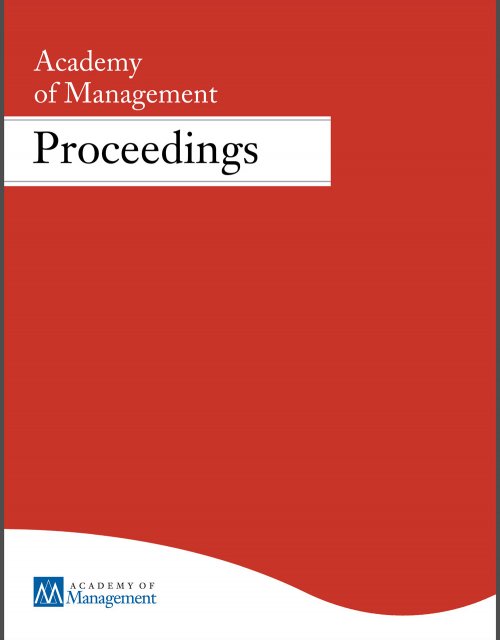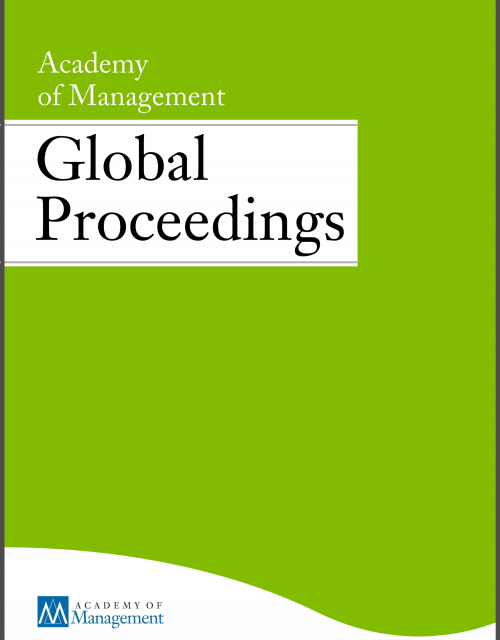Publication records
Subject(s)
Human resources management/organizational behavior
Keyword(s)
Gender, diversity, organization, performance, innovation
Extant research has shown that gender-diverse organizations tend to be more innovative than gender homogenous ones but has left unaddressed the question of who, among an organization’s workforce, becomes more innovative as gender diversity increases. We address this question by examining how gender diversity affects individual-level innovative performance, measured through patent-based indicators, within the R&D labs of the 40 largest pharmaceutical companies over the period 1985-2010. We argue that higher levels of gender diversity increase the performance of three categories of scientists – women, rookies, and brokers – whereas men, long-tenured scientists, and scientists embedded in constrained networks experience limited or no performance benefits. By demonstrating that gender diversity has a heterogeneous effect across different segments of an organization’s workforce, these results both deepen and qualify current understandings of how gender diversity affects innovation within organizations. A key implication of our proposed argument is that gender diversity does not only affect the overall performance of the organization; it also affects how performance (and hence the material and symbolic resources associated with it) are distributed within the organization.
With permission of the Academy of Management
Volume
2019
ISSN (Online)
2151-6561
ISSN (Print)
0065-0668
Subject(s)
Human resources management/organizational behavior
Keyword(s)
Executive coaching, boundaries in coaching, rescuer syndrome
Secondary Title
Complex situations in coaching: A critical case-based approach
Pages
56–59
ISBN
978-0367173234
Subject(s)
Economics, politics and business environment; Entrepreneurship
Keyword(s)
Energy sector, recommunalization, management of utilities, infrastructure policies, infrastructure services, regulatory models
The paper discusses economic perspectives on recommunalization in the energy sector. When privatization and deregulation of public infrastructure services became the dominant paradigm of public policy in the 1980s and 1990s, it was considered an adequate measure to increase efficiency, enable consumer choice, and foster a cultural change towards more competitive practices among the management of utilities. In retrospect, the move towards market principles and privatization in infrastructure policies has not yielded regulatory convergence towards a liberalized system architecture. On the contrary, it can be observed that in some infrastructure sectors liberalization has succeeded as the dominant design, whereas other infrastructure services have by and large remained in public ownership and under strict government control (Observation #1). An analysis of the electricity sector shows that a broad spectrum of diverse regulatory models co-exists – across world regions, countries, and even individual states, such as in the USA (Observation #2). The recent wave of recommunalizations may be interpreted as a backlash to free-market principles in infrastructure services. In bottom-up initiatives, citizens intend to reclaim (at least partial) control of public infrastructure services. These initiatives operate in a larger context of private individuals and associations entering the electricity sector in a new form of dispersed private ownership (Observation #3). In the future all the diverse models might co-exist while digitalization will provide transparency for the actors involved.
Pages
5
Subject(s)
Entrepreneurship; Human resources management/organizational behavior; Technology, R&D management
Keyword(s)
Entrepreneurship, human capital
Subject(s)
Human resources management/organizational behavior
Keyword(s)
Feedback, Dark Triad, leadership
Secondary Title
Fair talk: Three steps to powerful feedback
Pages
138–139
ISBN
978-1-912555-09-3
Subject(s)
Economics, politics and business environment; Finance, accounting and corporate governance
Keyword(s)
Financial integration, single market, European integration, free movement of capital
JEL Code(s)
F21, F33, F36, G21, G28
It is 25 years since the European Union (EU) agreed to complete the European Single Market (SM) in goods, services, people, and capital. While many barriers to the free movement of capital across borders have been removed, some important practical hurdles are still in place. The euro crisis has shown that the European financial sector in particular remains vulnerable and fragmented and this poses serious risks to the stability of both national economies and the euro area as a whole. In 2015, the European Commission therefore set out a list of measures to establish an integrated capital market in the EU by 2019.
The first part of this policy paper analyzes the channels through which financial integration affects growth, stability, and convergence in the EU, including capital allocation, production specialization, diversification of risk, and access to investment opportunities. The second part takes stock of persisting administrative and legal hurdles that impede full market integration. In particular, this paper distinguishes between a firm-level perspective, investors, and banks in its analysis. The final part provides some specific recommendations to improve the internal market for capital in the EU.
The first part of this policy paper analyzes the channels through which financial integration affects growth, stability, and convergence in the EU, including capital allocation, production specialization, diversification of risk, and access to investment opportunities. The second part takes stock of persisting administrative and legal hurdles that impede full market integration. In particular, this paper distinguishes between a firm-level perspective, investors, and banks in its analysis. The final part provides some specific recommendations to improve the internal market for capital in the EU.
Journal Pages
24
ISSN (Print)
1866–4016
Subject(s)
Information technology and systems
Keyword(s)
Hardware reverse engineering, malicious design modifications, embedded systems security
The threat of inserting hardware Trojans during the design, production, or in-field poses a danger for integrated circuits in real-world applications. A particular critical case of hardware Trojans is the malicious manipulation of third-party FPGA configurations. In addition to attack vectors during the design process, FPGAs can be infiltrated in a non-invasive manner after shipment through alterations of the bitstream. First, we present an improved methodology for bitstream file format reversing. Second, we introduce a novel idea for Trojan insertion.
Journal Pages
112–119
Subject(s)
Human resources management/organizational behavior; Management sciences, decision sciences and quantitative methods
Keyword(s)
Competition, conflict, social networks, status, tournaments
Journal Pages
10
Subject(s)
Human resources management/organizational behavior
Keyword(s)
Startup, scale-up, challenges
We examine the role of career preferences, ability, and structural constraints in explaining first-time employment in startups or established firms. Using panel data on 2,243 U.S. science and engineering PhDs observed before and after entering the job market, we find that ex ante career preferences significantly explain who joins a startup, while ability plays a limited role. Many individuals who prefer to join startups prior to graduation take jobs in established firms, in part due to the limited availability of startup jobs and visa constraints. Interestingly, these individuals are more likely to leave their first position in established firms jobs to join a startup later in time. We discuss implications for founders, managers in established firms, as well as for future research and policy makers.
With permission of the Academy of Management
Volume
Tel Aviv
ISSN (Print)
2638-4892
Subject(s)
Information technology and systems
Keyword(s)
Moving target defense, attack simulation, attack graphs, network
modeling
Secondary Title
Secure IT systems
Edition
1st ed.,
Pages
236–254

